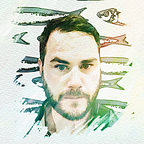Being Realistic, Pushing Buttons, and the Memory Jukebox
Thoughtful Net #65: curated links from the past few weeks
This is the first Thoughtful Net of 2019, and there are a lot of links because I’ve been busy with Christmas and a house move and life in general. I’m going to start with a little plug of my own work, then move on to a… manifesto? Proclamation? Not sure. Anyway, then I’ll finish with a regular round-up of links as usual. Hope you’ve got a bit of time to spare.
I Wrote This
Trends in Consumer Digital Technology for 2019.
I wrote this long piece about my thoughts on the smartphone decline, the rise of smart assistants, the second wave of voice, the post-mobile platform, and more. It took me ages, so I hope you can give it a little of your attention and — if you like it — perhaps applaud it and share it.
Being Realistic
I’m not blind to the unwanted and unexpected effects of technology. I know social media’s ad-funded business model can exaggerate populism (Why is Populism Booming? Today’s Tech is Partly to Blame, Jamie Bartlett) and artificial division (‘Nothing on this page is real’: How lies become truth in online America, Eli Saslow). But I worry that we exaggerate their negative effects too.
Hundreds of articles have been written about teens and the negative effects of social media, but the data isn’t reliable (The Problem With Studies Saying Phones Are Bad for You, Rachel Becker). Recent advice from the Royal College of Paediatrics and Child Health (RCPCH) says there is “essentially no evidence” that screen time is harmful to health (Stop Scaremongering About Kids Spending Time on Their Phones, Tom Chivers) and we should be cautious that this isn’t just baseless concern (Don’t Fall for the Moral Panic Over Children’s Screen Time, Nesrine Malik).
One recent survey of teens found that the vast majority said social media makes them feel more connected to friends, to make new friends, to be more creative, and to get support in tough times (Teens Say Social Media Isn’t As Bad For Them As You Might Think, Katie Notopoulos). And it’s not just teens that find support through social media; it can help with grieving (The Unexpected Best Use of Facebook, Katie Hawkins-Gaar), and digital technology more broadly is helping create a more inclusive world for people with physical and cognitive impairments (How Technology Helped Me Cheat Dyslexia, Lisa Wood Shapiro).
When people trot out the tired old trope of people with phones ignoring each other, I look at these amazing photos of the reach of smartphones into every part of our life (The Ubiquity of Smartphones, as Captured by Photographers, Alan Taylor). When people complain about Facebook, I turn to what Ben Thompson wrote:
Facebook is humanity. That is why it is so valuable, and it is why it can be so awful. It is why there is tremendous beauty there, and why there is tremendous “hate and misinformation.” Those are not Facebook issues; those are human issues, and they can only be managed, not cured.
Let’s be realistic about the harms of technology and social media, but let’s not forget that it brings benefits too.
The Best
Who Pushes the Button?, Rachel Plotnick.
A history of buttons doesn’t sound too promising, but this is a great piece looking at the early moral panic around buttons and the subsequent changes in attitudes over the years. This pushed my buttons (ha ha).
For critics of these rapid technological changes, carrying out an activity ‘by hand’ or ‘manually’ signified not only exerting greater effort, but also engaging in a fundamentally human activity.
That sounds familiar.
The World-wide Web
The Internet, but Not as We Know It: Life Online in China, Cuba, India and Russia, Michael Safi, Lily Kuo, Ed Augustin and Andrew Roth.
A nicely animated interactive snapshot of the different ways people around the world experience the internet.
How Facebook Uses ‘WhatsApp Phones’ to Tap Next Emerging Market, Saritha Rai.
In [Pune’s] teeming Kondhwa Market, a team of traveling performers dressed in green WhatsApp T-shirts reprise their skit throughout the day. It opens with a rowdy game of cricket, then friends share the excitement of taking selfies and creating WhatsApp friends’ groups.
Everything Else
How Google Photos Became a Perfect Jukebox for Our Memories, Farhad Manjoo.
Google Photos suggests the dawning of a new age of personalized robot historian. The trillions of images we are all snapping will become the raw material for algorithms that will curate memories and construct narratives about our most intimate human experiences. In the future, the robots will know everything about us — and they will tell our stories.
That final sentence…
The ‘Future Book’ Is Here, but It’s Not What We Expected, Craig Mod.
I’m a fan of eBooks for their convenience, but am the first to admit that the form never met its full potential — largely, I would argue, because of publishers (buy me a drink some time and I’ll go on about it at length).
Technology changed everything that enables a book, fomenting a quiet revolution. Funding, printing, fulfillment, community-building — everything leading up to and supporting a book has shifted meaningfully, even if the containers haven’t.
A Business With No End, Jenny Odell.
Down the rabbit hole is a world created by the interesection of Amazon, the internet, cheap globalised imports, and religion.
In the Shadow of the CMS, Kyle Chayka.
People don’t generally see the systems that manage content for the big online publishers, but they shape the way we read news in interesting and unexpected ways.
The Thoughtful Net is an occasional (less than weekly, more than monthly) publication collecting great writing about the internet and technology, culture, information, society, science, and philosophy. If you prefer to receive it in your inbox you can follow this publication or subscribe to the email newsletter.
